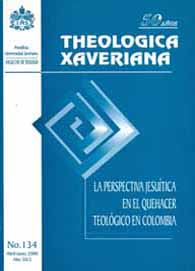Abstract
El Seminario de Planificación Pastoral se gestó en torno a la Conferencia Latinoamericana de Puebla. La forma seminario permitía experimentar la riqueza del taller, a partir de la experiencia de acción pastoral de los participantes y la profundidad de reflexión que aportaban los marcos teóricos en una etapa analítica. En estos dos momentos construiríamos una nueva propuesta de acción pastoral.
La planificación pastoral surgió como el eje en torno al cual podríamos estructurar el Seminario. Lógicamente, como éste surgió alrededor de Puebla, el planteamiento central de la conferencia influyó en nuestra decisión: analizar la realidad de la acción pastoral de la Iglesia en América Latina y hacer una reflexión pastoral sobre esa realidad, para llegar a definir unas opciones pastorales.
El Seminario de Planificación también tiene una historia de corrientes ideológicas, que fueron confluyendo hasta constituir la forma seminario. Por esta razón, pretendo dividir el trabajo en tres partes:
– Qué corrientes ideológicas vertebraron la ideología
central del Seminario de Planificación Pastoral.
– Su nacimiento en torno a Puebla y su historia.
– La descripción de la metodología adoptad
This journal is registered under a Creative Commons Attribution 4.0 International Public License. Thus, this work may be reproduced, distributed, and publicly shared in digital format, as long as the names of the authors and Pontificia Universidad Javeriana are acknowledged. Others are allowed to quote, adapt, transform, auto-archive, republish, and create based on this material, for any purpose (even commercial ones), provided the authorship is duly acknowledged, a link to the original work is provided, and it is specified if changes have been made. Pontificia Universidad Javeriana does not hold the rights of published works and the authors are solely responsible for the contents of their works; they keep the moral, intellectual, privacy, and publicity rights.
Approving the intervention of the work (review, copy-editing, translation, layout) and the following outreach, are granted through an use license and not through an assignment of rights. This means the journal and Pontificia Universidad Javeriana cannot be held responsible for any ethical malpractice by the authors. As a consequence of the protection granted by the use license, the journal is not required to publish recantations or modify information already published, unless the errata stems from the editorial management process. Publishing contents in this journal does not generate royalties for contributors.


